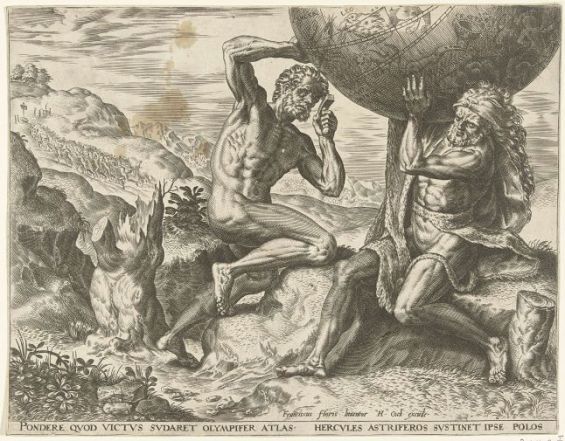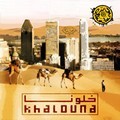Morocco, as part of North Africa, had a number of shared myths with Romans and Greeks. Amazighs that inhabited this ancient part of the world believed in these myths, cherished its heroes and worshipped its gods for centuries.
Many of these heroes, giants and titans lived in North Africa and had their stories marking the existence of several cities in the region, including Tangier in Morocco and Benghazi in Libya. Although they were fictitious heroes and figures, their names are still part of our daily lives.
Here we talk about Atlas, as in the Atlas Mountains, Tingis, the ancient name of the city of Tangier and Antaeus who is linked to monuments near the city of Asilah. Therefore, who are these gods and what about their battles and victories?
Atlas, the heavens’ bearer and the king of Morocco’s mountains
In Greek mythology, he is a titan, a race of deities originally worshipped by ancient Greeks. But in North Africa, he is the figure behind the name of Morocco’s largest mountain range. Others call him the king of Mauretania, the Latin word for the ancient Maghreb, which stretched from present-day Algeria to Morocco.
The myth tells us that Zeus, god of the sky and thunder in Greek mythology, condemned Atlas to hold the heavens forever as a punishment. According to Mythencyclopedia, because famous Atlas «stood to perform his task at the westernmost end of the world known to the ancient Greeks, the ocean near him was called Atlantic in his honor».

But this was not the only thing that linked the titan god to Morocco. Other accounts suggest that the Atlas Mountains are the remains of Atlas. According to the aforementioned platform, this story is associated with «Perseus, son of Zeus and slayer of the Gorgon Medusa».
«Because of a prophecy that a son of Zeus would one day steal the golden apples of the Hesperides (the daughters of the evening, who are also believed to be the daughters of Atlas), Atlas refused to offer Perseus hospitality when he came to visit», the same source recalled.
«Insulted, Perseus showed him the severed head of Medusa, which had the power to turn all who looked at it into stone (…) Atlas turned into stone. The stone became the Atlas Mountains in what is now the country of Morocco».
It is also believed that Berbers who lived in North Africa worshipped these Atlas Mountains.
Antaeus, buried in Msoura and married to a Moroccan goddess
Legends surrounding the life of this invincible giant say that he lived in Libya, while others claim that he resided in Morocco, and most precisely Tangier. However, most of the accounts related to Antaeus suggest that he was the son of Poseidon, the god of the sea, earthquakes, storms and horses in ancient Greek religions and myths, and Gaia, also known as the Mother Earth.
Besides residing in Morocco, the myth of this Greek giant is deeply linked to the country. «He was the husband of the Berber goddess Tinjis», which was behind the name of Tangier. Antaeus is mainly known for his fight with Hercules, the divine Greek hero and the son of Zeus.
In his book «Morocco Footprint Handbook»(Footprint Travel Guides, 2012), Julius Honnor reports that in Roman mythology, Antaeus is seen as the giant who challenged Hercules.

«The hero killed the giant and had a child by his widow, Tinjis», he wrote. This myth is further explained by Mythologies, a book by Media Press.
«The legends tell that he was the undefeatable protector of Libyans (…) he used to protect the land of Berbers until he was slain by the Greek hero Heracles, who married Tinjis and fathered the son Sophax (Berber-Greek son)», the same book added.
Quoting Plutarch, a Greek biographer and essayist, the same book reports that «the Libyans buried Antaeus in Tangier» and that his «tomb was dug open by Sertorius», a Roman noble.
However, a different account indicates that the giant was buried in Mzora, an ancient site that houses a stone circle. According to ancient origins, «Mzora was first described by the Roman general Quintus Sertorius in the 1st Century AD as he was told it was the tomb of Antaeus – a legendary giant who was slayed by the heroic demigod Hercules as one of his labors».
Sufax, the founder of Tinjis
After the epic fight between Antaeus and Hercules, Sufax was the fruit of the Greek hero’s victory. Son of Tinjis and Hercules, Sufax, also known as Sophax, Syphax, Sufaqs, was also a hero and a demigod.

The legend says that the mythological figure founded the city of Tangier and called it «Tinjis» to honor his mother. Another myth reveals that the father of this hero, Hercules «pulled apart Spain and Africa to give his son, a city protected by the sea».
According to Berber mythology, many Berber kings believed that they were the descendants of Sufax. Indeed, Numidian king Juba II spread the idea that he was also a descendent of Sufax.
Now that you have an idea about the story of the gods our ancestors worshipped, which one would be your favorite?





 chargement...
chargement...













